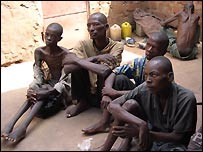By Franz Wild
11/25/08
 Nov. 25 (Bloomberg) — Human Rights Watch said Congo’s President Joseph Kabila had opposition members tortured in a “lurch to authoritarian rule” after winning the nation’s first democratic elections in four decades in 2006.
Nov. 25 (Bloomberg) — Human Rights Watch said Congo’s President Joseph Kabila had opposition members tortured in a “lurch to authoritarian rule” after winning the nation’s first democratic elections in four decades in 2006.
“Kabila set the tone and direction” for the killing or summary execution of 500 people and often arbitrary detention of about 1,000 more, the New York-based group said in an e-mailed report today. Torture included “the use of electric batons on their genitals and other parts of their bodies, beatings, whippings, and mock executions,” it said.
Congolese Communications Minister Lambert Mende may comment on the report later today, his personal secretary, Benoit Wetshindjabi, said in a phone interview. Kudura Kasongo, Kabila’s spokesman, didn’t answer several calls to his mobile phone seeking comment.
Congo’s elections two years ago marked a key step in the central African nation’s transition to democracy after years of economic and political mismanagement, mostly under former dictator Mobutu Sese Seko. Two civil wars between 1996 and 2003 killed at least 4 million people, the majority from disease and starvation. The country, the size of Western Europe, has a population of about 62 million people.
Repression in Congo was focused on the capital, Kinshasa, and the western Bas-Congo province, where Kabila faces the strongest opposition, Human Rights Watch said. The group interviewed more than 250 people, including military and intelligence officials, between August 2006 and June 2008.
Father Assassinated
Kabila took office after his father and predecessor Laurent Kabila was assassinated in 2001. Laurent came to power in 1997 after toppling Mobutu’s three-decade-old regime with support from neighboring Rwanda. Laurent avoided a similar fate a year later with military support mainly from Angola and Zimbabwe, triggering the nation’s second civil war, the world’s deadliest war since World War II.
A 2002 peace deal brought rebel leaders into a transition government to prepare elections, which Kabila won in a second- round run-off. In March 2007, the army clashed with about 600 armed men loyal to Kabila’s main opponent, Jean-Pierre Bemba, in Kinshasa, killing at least 384 people. Bemba, who fled to exile in Portugal, claims Kabila has tried to have him killed at least three times.
Reluctant to criticize the young democracy, the international community has taken too little notice of state- sanctioned violence in Congo, Human Rights Watch said.
“Donor nations and other international actors have given little attention to the grave human rights violations of the first two years of the Kabila government,” it said.
To contact the reporter on this story: Franz Wild in Kinshasa via Johannesburg at pmrichardson@bloomberg.net.
